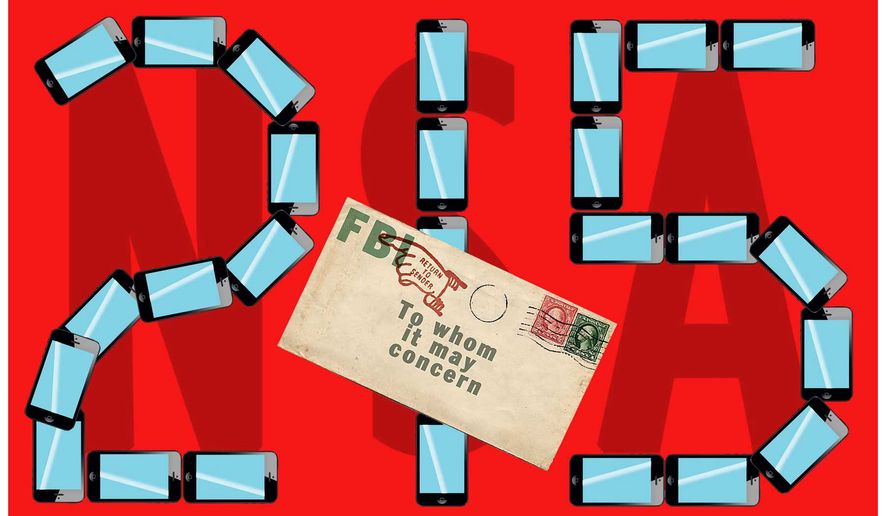OPINION:
The Senate, which will never be known for an overly demanding work schedule, returns from its week-long recess a whole day early to deal with the mess being made of one of our most important anti-terrorist intelligence programs. That program, now encompassed by Section 215 of the unfortunately named Patriot Act, has its roots in the Foreign Intelligence Surveillance Act of 1978, or FISA.
As its name implies, FISA was intended to enable U.S. intelligence agencies to intercept communications between foreign spies in the United States and their bosses overseas. Section 215 has been the foundation upon which the National Security Agency’s metadata-gathering program was built.
The current mess is in two parts: First, the House-passed USA Freedom Act, which takes apart the NSA’s metadata-gathering program; and the second, Sen. Rand Paul’s demand that the program be ended entirely.
The House’s bill shifts the burden of collecting and preserving the metadata (which consists only of the phone numbers involved and the length of the call, not the content of the conversation) to private telecom firms. The House approach is entirely wrong, because it may prevent our intelligence agencies from getting the data they need (or at least make the process take much longer, thereby devaluing the intelligence), and it will impose what may be huge costs on the companies required to keep the data.
Mr. Paul bases his opposition to Section 215 on a constitutional calumny. He wrongly interprets the Fourth Amendment — which protects us against unreasonable searches and seizures — as prohibiting the gathering of metadata. During his nearly 11-hour miniature filibuster against a Senate bill that would have renewed Section 215 unchanged, Mr. Paul said that the government shouldn’t be able to get information until they have probable cause that someone has committed a crime. He’s obstreperously opposed to the NSA metadata program and Section 215 based on his limited knowledge of the Constitution.
First, government gathering of telephone metadata without a search warrant is entirely constitutional as the courts have repeatedly ruled. The Fourth Amendment’s protection of our “persons, houses, papers and effects” doesn’t come into play because the metadata aren’t ours. The telephone companies own the metadata of our telephone accounts, both ground lines and cellphones. You have the right to privacy in your phone conversations but not in the service records.
The metadata program enables the NSA to spot suspicious actions by picking up on calls made between people here and possible terrorist connections abroad. Its actions in doing so are supervised by the Foreign Intelligence Surveillance Act Court, which meets and issues its rulings in secret. It’s only after NSA spots a suspicious activity that it can go back to the FISA court and get a specific search warrant to further investigate by actually recording conversations and reading Internet traffic.
Let’s make this very clear: the NSA metadata program violates no one’s constitutional rights. Just as importantly, though I can’t cite specific cases in which it has led to the interdiction of terrorist attacks in this country (because the information is classified) intelligence community sources have repeatedly told me that it has done so and is an effective and valuable intelligence tool.
But there are problems with the Patriot Act, and a newly released report by the FBI’s inspector general shows why.
One part of the Patriot Act creates the FBI’s authority to serve secret “national security letters” on businesses or private persons to obtain their paper records in pursuit of a lead on a terrorist investigation. The FBI, which reportedly has issued more than 300,000 such letters during the past 10 years — does this on its own, and no judge is needed to authorize issuing the letters. The letters are clearly violative of the Fourth Amendment because they destroy our security in our “persons, houses, papers and effects.” Businesses and individuals who receive such letters cannot legally disclose the fact to anyone they’ve been served such a letter. Challenging those letters is very difficult and costly to do.
The FBI national security letters are not only a clear violation of the Fourth Amendment, they’re also not worth much to the FBI. The FBI inspector general’s report says that Section 215’s “business records” authority has been used, but “the agents we interviewed did not identify any major case developments that developed from the use of the records obtained in response to Section 215 orders .” The report says it was valuable in developing other case leads and evidence.
Because the part of the Patriot Act authorizing the FBI’s “national security letters” apparently doesn’t work, it should be repealed or at least restricted to conform with the Fourth Amendment’s requirements for search warrants and court supervision. Mr. Paul’s libertarian objections to the metadata program should be disregarded because of the constitutional ignorance on which they are based.
The 2nd U.S. Circuit Court of Appeals’ order of May 7 held that the NSA’s metadata program went beyond what Congress had authorized. That may be so, but the court didn’t rule that the program was unconstitutional because it patently isn’t.
Congress should carefully consider a long-term reauthorization of Section 215 that would resolve the court’s concerns and amend it to ensure the metadata program can proceed and continue to gather intelligence necessary to keep this nation safe. Letting that authority expire would be irresponsible, as would Congress’ failure to deal with the court’s concerns.
Section 215 is too important for lawmakers to just let it fade away. They should mend it, not end it.
• Jed Babbin was deputy undersecretary of defense in the George H.W. Bush administration and is co-author of “The Sunni Vanguard” (London Center for Public Policy, 2014).




Please read our comment policy before commenting.